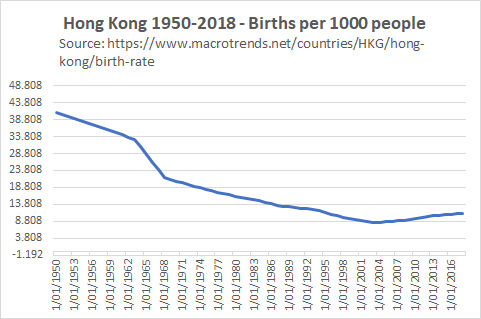 Poverty, unemployment, homelessness, and overcrowding stalk more and more Hong Kong citizens. The United States is pushing for regime change, but that won't change anything for the better. In this half-hour video about the Hong Kong riots, and more about the US attempts at regime-change there than you will hear elsewhere, Michelle Greenstein gives a rundown on the social problems that have made the Hong Kong poor ready to riot. Although Greenstein talks about wealth inequality and the need for better distribution, she fails to identify what it is about Hong Kong's system that has caused these massive social disparities and housing shortfalls. The Hong Kong inheritance system is probably a major contributor to Hong Kong's wealth disparity and homelessness, however. Hong Kong's system is similar to Australia's and that of most American states. Inherited from Britain, it allows parents to disinherit their children and to leave property to anyone they choose.[1] This permits the alienation of property from families and its aggregation within corporations, other families or individuals, in fewer and fewer hands. The people lose control of the place. It is in this way that property speculation has come to rule over democracy in Hong Kong. The Hong Kong population and property growth lobby has taken over by engineering Hong Kong's population growth, with immigration numbers about three times as high as natural replacement numbers since 2014. A pretext, as in Australia, is that immigrants are needed to combat 'population aging'. We can see that Hong Kong citizens have been trying to control things from their side by having lower and lower birth rates, but the ruling classes have simply overruled them by pushing high immigration, to push up housing prices, despite the homelessness this creates. The rules for immigration are similar to Australia's, especially in the encouragement of foreign students to apply for permanent status.[2] Foreign domestic workers make up 4% of Hong Kong's population! [3]
Poverty, unemployment, homelessness, and overcrowding stalk more and more Hong Kong citizens. The United States is pushing for regime change, but that won't change anything for the better. In this half-hour video about the Hong Kong riots, and more about the US attempts at regime-change there than you will hear elsewhere, Michelle Greenstein gives a rundown on the social problems that have made the Hong Kong poor ready to riot. Although Greenstein talks about wealth inequality and the need for better distribution, she fails to identify what it is about Hong Kong's system that has caused these massive social disparities and housing shortfalls. The Hong Kong inheritance system is probably a major contributor to Hong Kong's wealth disparity and homelessness, however. Hong Kong's system is similar to Australia's and that of most American states. Inherited from Britain, it allows parents to disinherit their children and to leave property to anyone they choose.[1] This permits the alienation of property from families and its aggregation within corporations, other families or individuals, in fewer and fewer hands. The people lose control of the place. It is in this way that property speculation has come to rule over democracy in Hong Kong. The Hong Kong population and property growth lobby has taken over by engineering Hong Kong's population growth, with immigration numbers about three times as high as natural replacement numbers since 2014. A pretext, as in Australia, is that immigrants are needed to combat 'population aging'. We can see that Hong Kong citizens have been trying to control things from their side by having lower and lower birth rates, but the ruling classes have simply overruled them by pushing high immigration, to push up housing prices, despite the homelessness this creates. The rules for immigration are similar to Australia's, especially in the encouragement of foreign students to apply for permanent status.[2] Foreign domestic workers make up 4% of Hong Kong's population! [3]
Hong Kong's population history
Hong Kong's population history is one of foreign takeover of a small fishing village, then population explosion.[4] When the British took over in 1841, the population was 7,541. In a century it grew to 1,600,000. After the Battle of Hong Kong, the population fell to 500,000 in 1945. Many Chinese migrated to Hong Kong to escape natural disasters and the Taiping Rebellion of the 1850s. 60,000 Chinese left in 1914 due to wartime fears. The population increased to 530,000 in 1916, then to 725,000 in 1925, to 1.6million in 1941, then to 2.2 million in 1950. By 2001 Hong Kong's population was 6.7 million. Demographers expect its population to reach 8.469 million by 2041, with 52100 births and 82,400 deaths predicted by The Census and Statistics Department.[4] After that it would plateau out, due to low birth rates, but the growth lobby will do everything it can to prevent that, of course.
The same thing is happening to Australia, which has similar inheritance laws and has been saddled with malignant growth by the property development lobby, which has taken over all the main political parties and governments, and pushes mass immigration.
Some may be surprised to know that the Republic of China does not allow the dispossession of children except in extraordinary cases. It has similar laws to France. These laws, which make parents financially loyal to their children also have a wealth-equalising principle. Whilst it is true that people can be come very rich in China and France (although less so), Australian or Hong Kong inheritance laws would make things much much worse.

NOTES
Lawyers love this kind of law, for obvious reasons - it gives rise to so many disputes. See this comment from "Testamentary freedom and disinheritance in Hong Kong.">
"[...] unexpected exclusions in a loved one’s will can cause untold pain, and bitter dispute that can divide families for years to come.
Many countries choose to pre-empt such issues with strict laws covering succession and inheritance. One such example is France, where the estate of the deceased is automatically divided equally between their surviving spouse and children. [...]
Inheritance Law In Hong Kong
Here in Hong Kong, we have the right to testamentary freedom. Broadly speaking, this means we are all free to leave our estates to anyone we wish – be that a relative, friend, favourite charity… or even a total stranger!" (Source: "Testamentary freedom and disinheritance in Hong Kong.">
[2] See https://web.archive.org/web/20120623220528/https://www.immd.gov.hk/a_report_09-10/eng/ch1/index.htm
[3] "Foreign domestic helpers make up 4% of Hong Kong’s population. The estimated 250,000 foreign domestic workers mostly come from the Philippines and Indonesia." Source: https://worldpopulationreview.com/countries/hong-kong-population/
[4]Hong Kong population history.

 Poverty, unemployment, homelessness, and overcrowding stalk more and more Hong Kong citizens. The United States is pushing for regime change, but that won't change anything for the better. In this half-hour video about the Hong Kong riots, and more about the US attempts at regime-change there than you will hear elsewhere, Michelle Greenstein gives a rundown on the social problems that have made the Hong Kong poor ready to riot. Although Greenstein talks about wealth inequality and the need for better distribution, she fails to identify what it is about Hong Kong's system that has caused these massive social disparities and housing shortfalls. The Hong Kong inheritance system is probably a major contributor to Hong Kong's wealth disparity and homelessness, however. Hong Kong's system is similar to Australia's and that of most American states. Inherited from Britain, it allows parents to disinherit their children and to leave property to anyone they choose.[1] This permits the alienation of property from families and its aggregation within corporations, other families or individuals, in fewer and fewer hands. The people lose control of the place. It is in this way that property speculation has come to rule over democracy in Hong Kong. The Hong Kong population and property growth lobby has taken over by engineering Hong Kong's population growth, with immigration numbers about three times as high as natural replacement numbers since 2014. A pretext, as in Australia, is that immigrants are needed to combat
Poverty, unemployment, homelessness, and overcrowding stalk more and more Hong Kong citizens. The United States is pushing for regime change, but that won't change anything for the better. In this half-hour video about the Hong Kong riots, and more about the US attempts at regime-change there than you will hear elsewhere, Michelle Greenstein gives a rundown on the social problems that have made the Hong Kong poor ready to riot. Although Greenstein talks about wealth inequality and the need for better distribution, she fails to identify what it is about Hong Kong's system that has caused these massive social disparities and housing shortfalls. The Hong Kong inheritance system is probably a major contributor to Hong Kong's wealth disparity and homelessness, however. Hong Kong's system is similar to Australia's and that of most American states. Inherited from Britain, it allows parents to disinherit their children and to leave property to anyone they choose.[1] This permits the alienation of property from families and its aggregation within corporations, other families or individuals, in fewer and fewer hands. The people lose control of the place. It is in this way that property speculation has come to rule over democracy in Hong Kong. The Hong Kong population and property growth lobby has taken over by engineering Hong Kong's population growth, with immigration numbers about three times as high as natural replacement numbers since 2014. A pretext, as in Australia, is that immigrants are needed to combat 
Recent comments